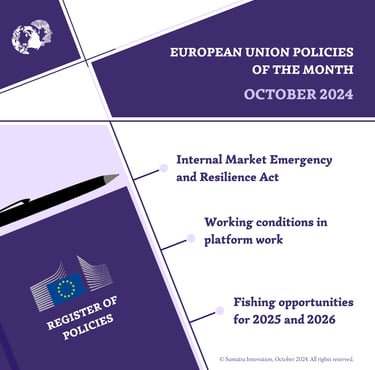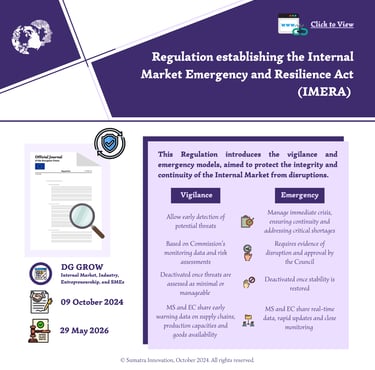Register of Policies / October 2024



1/ Regulation establishing the Internal Market Emergency and Resilience Act (IMERA)
Recent crises, such as the COVID-19 pandemic and geopolitical tensions directly impacting supply chains, have exposed the vulnerabilities of the EU's single market. This Regulation translates the need for a framework to deal with such emergencies, by preparing for, addressing, and mitigating internal market disruptions in order to protect its integrity and continued functioning. The regulation introduces two models for responding to crises: Vigilance and Emergency. The vigilance model deals with potential threats that can escalate into a real emergency, while the emergency model focuses on confirmed and serious market disruptions. Each model has its own measures (vigilance, restriction, prohibition, mitigation) and criteria for activation, extension and deactivation. It also includes measures aimed at streamlining procurement processes in emergencies, such as the possibility for the Commission to conduct joint procurement on behalf of Member States to ensure access to crisis-relevant goods and services.
EU law: Regulation (EU) 2024/2747
2/ Directive on improving working conditions in platform work
Platform work, a form of employment in which organizations or individuals solve specific problems or provide specific services in exchange for payment through an online platform, has grown rapidly. While the gig economy offers numerous flexible employment opportunities in various sectors (e.g., transportation, on-demand services, digital tasks), it also lacks traditional labor protections. This directive was developed to address the challenges associated with platform work, such as employment classification, workers' rights and data protection. For example, it clarifies employment status by stating that workers are considered employees if there is evidence of direction and control by a platform. The directive gives workers the right to human review of decisions made by automated systems and the right to access information about automated systems used to manage their work, including task assignment, earnings and performance evaluation. Under the new legislation, platforms are prohibited from using biometric data for general identification purposes and are restricted when collecting workers' data about their personal, non-work-related data, emotional state and private conversations. The overall aim of the directive is in line with the European Pillar of Social Rights, which aims to provide better working conditions and social protection for all workers.
EU law: Directive (EU) 2024/2831
3/ Proposal for a Council Regulation fixing the fishing opportunities for certain fish stocks for 2025 and 2026
As part of the European Union's Common Fisheries Policy (CFP), the Commission has presented several proposals for Council regulations on fishing opportunities. The aim is to ensure the sustainable management of fish stocks through total allowable catches (TACs) and quotas and to strike a balance between environmental health and the economic interests of the fishing industry. On October 31, 2024, the Commission presented a proposal on fishing opportunities for the years 2025 and 2026. The proposal includes, for example, TACs for EU and non-EU fishing vessels, prohibited species, special provisions for certain waters (e.g. Celtic Sea, Irish Sea, North Sea) and transactions and exchanges with non-EU countries such as Norway and the United Kingdom.
EU law: COM/2024/506 final







